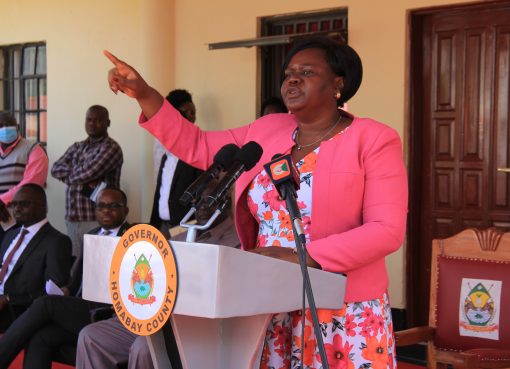Dairy Farmers in Kisii County are yet to benefit from three milk cooler machines supplied through a Tie-Aid agreement between the Kenyan government and Republic of Poland.
Farmers now want Kisii county Government to install electricity at a cost of Sh. 350,000, to jumpstart operation of the machines which were delivered one year ago, and which are meant to enable value addition to the dairy product.
The cooler machines were installed at Agricultural Training Centre (ATC) in the outskirts of Kisii Town, Gesusu in Masaba south Sub County and Bomabobo in Kenyenya division, Bomachoge Borabu Sub County with an aim of supporting modernization of Agriculture and livestock Sector.
It was for this reason that Agriculture Cabinet Secretary (CS), Mwangi Kiunjuri requested the County Development Implementation and Coordination Committee (CDICC) to inspect and confirm that the coolers were delivered and are in good working condition.
In his letter dated 15th October this month and copied to Interior and National Coordination Cabinet Secretary (CS), Dr. Fred Matiang’i, Kiunjuri noted the Polish Tied-Aid credit program was meant to support modernization of agriculture by delivering and installing 350 coolers with 3,000litre capacity to registered dairy farmers cooperatives societies across the country among other measures.
During the CDICC visit to inspect the status in the county, the Kenya Power county Business Manager, Mang’era Moronge decried delay by the county government to honor quotations raised one year ago, saying they were derailing utility of the machines.
“The quotations raised one year ago have expired and will need to be renewed at new rates for phase three connectivity,” noted Mang’era about the coolers which also need ample supply with clean water.
Riomabobo Dairy which is the only one connected with 3 phase electricity is affected by power outages and high cost of running a generator to supplement the power.
According to Bomabobo Dairy Project Manager, Laban Magara, the cooler once fully operational will attract more famers to supply their milk to the facility for value addition.
Magara noted many of the farmers have however declined to supply their milk at the dairy cooler plant which purchases at sh. 33 per liter, preferring to sell to hotels and schools among others at sh. 40 per litre.
“Power disturbance at Bomabobo, is due to tampering by road constructors who also fail to report early enough for action to be taken,” said Mang’era.
According to Mang’era, a WhatsApp group has been formed where the Dairy factory manager can report disruptions for quick action.
The Principal ATC, Dorice Ombuna told CDICC which was led by Chairman, Leonard Mgute that the plant once operational will benefit the community by enabling value addition on milk to make commodities like yoghurt, and sour milk among other products.
The County Director of Livestock, Andrew Nyamwaro appealed to the National Government to also provide the solar panels to act as a backup in the event of power outages.
According to Kisii County Website, the region is a high potential area for livestock farming with the 2012 estimates indicating 268,445 heads of cattle, 84,462 goats, 31,425 sheep, 10,000 broilers, 110,700 layers and 1,074,430 indigenous poultry.
It states milk marketing is predominantly through informal channels whereby fresh milk is sold direct to consumer individuals and institutions.
Formalized channels like cooler plants gives an opportunity for processing and value addition of the highly perishable commodity.
The county currently produces approximately 191 million liters of milk in a year and production is expected to increase with the establishment of the plant.
Lucky farmers like Moses Nyaira fom Tendere sub location, Gucha sub county milks up to 10 litres per day, five in the morning and five in the evening.
Nyaira said he sell his milk at sh.50 a litre, the proceeds he said has been able to educate a child through university, and fend for his other family’s needs.
“I urge the government to install the cooler machines fast so that I can earn more from value addition on this product,” urged Nyaira.
A smallholder dairy production review done recently by Ministry of Livestock Development, Nakuru County, Kenya’s dairy sub sector contributes about 8 per cent of Gross Domestic Product (GDP) with an annual milk production of 3.43 billion liters.
Although smallholder Dairy farmers make up to 80 per cent of total dairy producers and produce 56 per cent of total milk in Kenya, they are constrained by low quantity and quality of feeds, lack of reliable statistical information on milk market outlets, poor road infrastructure, lack of collateral for loans, low technical skills on husbandry practices and reduced access to veterinary and Artificial Insemination (AI) services.
By Jane Naitore



